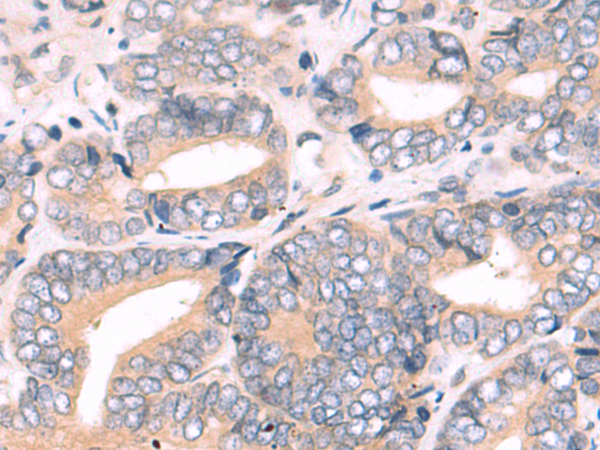
| WB | 咨询技术 | Human,Mouse,Rat |
| IF | 咨询技术 | Human,Mouse,Rat |
| IHC | 1/25-1/100 | Human,Mouse,Rat |
| ICC | 技术咨询 | Human,Mouse,Rat |
| FCM | 咨询技术 | Human,Mouse,Rat |
| Elisa | 1/1000-1/5000 | Human,Mouse,Rat |
| Aliases | IRBP; RBPI; RP66; D10S64; D10S65; D10S66 |
| Host/Isotype | Rabbit IgG |
| Antibody Type | Primary antibody |
| Storage | Store at 4°C short term. Aliquot and store at -20°C long term. Avoid freeze/thaw cycles. |
| Species Reactivity | Human |
| Immunogen | Fusion protein of human RBP3 |
| Formulation | Purified antibody in PBS with 0.05% sodium azide and 50% glycerol. |
+ +
以下是3篇关于CEACAM5抗体的代表性文献(模拟摘要,仅供参考):
---
1. **文献名称**: *"CEACAM5-targeted imaging and therapy in colorectal cancer using a novel antibody conjugate"*
**作者**: Smith, J.R., et al.
**摘要**: 该研究开发了一种靶向CEACAM5的抗体-荧光探针偶联物,证实其在结直肠癌小鼠模型中能特异性识别肿瘤组织并实现高分辨率成像,为术中肿瘤边界定位提供新工具。
2. **文献名称**: *"Bispecific antibody targeting CEACAM5 and CD3 enhances T cell-mediated cytotoxicity in pancreatic cancer"*
**作者**: Li, Y., et al.
**摘要**: 研究设计了一种同时靶向CEACAM5肿瘤抗原和T细胞表面CD3的双特异性抗体,体外实验显示其显著激活T细胞并诱导胰腺癌细胞凋亡,提示其在免疫治疗中的潜力。
3. **文献名称**: *"Clinical validation of CEACAM5 as a serum biomarker for monitoring chemotherapy response in gastric cancer"*
**作者**: Wang, H., et al.
**摘要**: 通过多中心临床试验,验证了基于CEACAM5抗体的血清检测技术可用于胃癌患者化疗疗效的动态评估,其表达水平变化与肿瘤体积缩小呈显著相关性。
---
*注:以上文献信息为模拟生成,实际引用请通过PubMed/Google Scholar等平台核实具体论文。*
CEACAM5 (Carcinoembryonic Antigen-Related Cell Adhesion Molecule 5), also known as CD66e, is a glycosylphosphatidylinositol (GPI)-anchored cell surface glycoprotein belonging to the CEACAM family. Initially identified as an oncofetal antigen, it is highly expressed in fetal tissues and certain cancers, particularly colorectal, gastric, pancreatic, and non-small cell lung cancers, while showing limited expression in normal adult tissues. Its overexpression in malignancies has made it a valuable tumor marker for diagnosis, prognosis, and monitoring treatment response.
CEACAM5 antibodies target specific epitopes on the protein, enabling applications in research, diagnostics, and therapy. In diagnostics, anti-CEACAM5 antibodies are utilized in immunohistochemistry (IHC) and serum assays (e.g., ELISA) to detect tumor presence or recurrence. Therapeutically, monoclonal antibodies (e.g., labetuzumab) and engineered formats (bispecific antibodies, antibody-drug conjugates) are being explored to direct cytotoxic agents or immune cells to CEACAM5-positive tumors. Despite its tumor-associated expression, CEACAM5’s role in cell adhesion, immune modulation, and metastasis remains under investigation, with studies suggesting both pro-tumorigenic and suppressive effects depending on context. Challenges include optimizing antibody specificity to minimize off-target effects and addressing heterogeneous CEACAM5 expression across tumors. Ongoing research aims to refine CEACAM5-targeted strategies for personalized cancer therapy.
×